Analysis of Economic Protectionism: Pros, Cons, and Impacts
VerifiedAdded on 2022/07/29
|5
|753
|32
Essay
AI Summary
This essay provides a comprehensive analysis of economic protectionism, a financial strategy that limits imports through various techniques like tariffs and quotas. The paper examines both the advantages and disadvantages of this approach. The pros discussed include the promotion of local employment, protection of new companies, reduction of financial gaps, and the enhancement of national security. Conversely, the cons highlighted are the potential for increased prices, limited consumer choices, short-term gains, and the potential for trade wars. The essay concludes by emphasizing the importance of precise implementation to maximize the benefits of protectionism and avoid negative impacts on the domestic economy, referencing sources like McGee (2014) and Vittana (2020) to support its arguments.
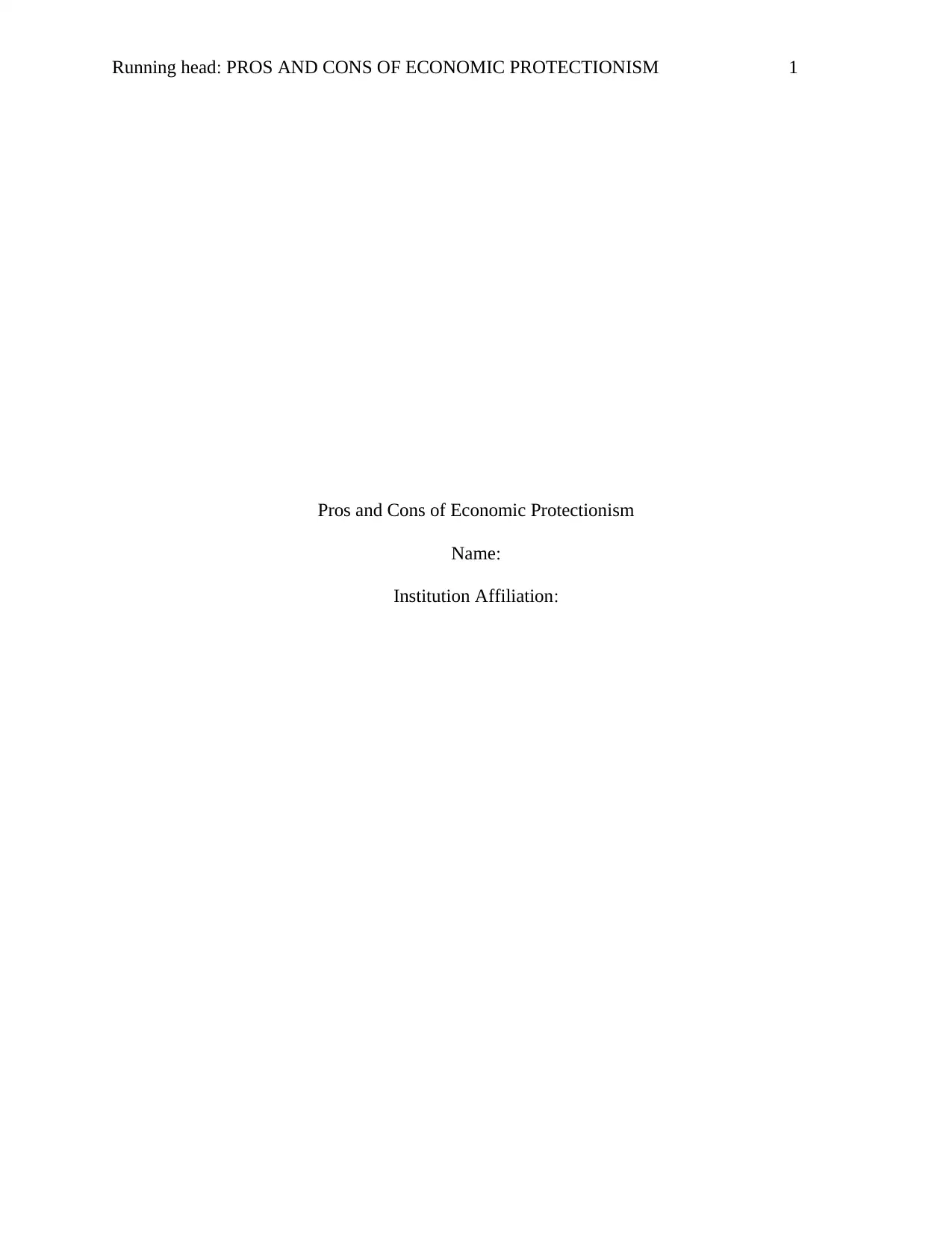
Running head PROS AND CONS OF ECONOMIC PROTECTIONISM 1
Pros and Cons of Economic Protectionism
Name
Institution Affiliation
Pros and Cons of Economic Protectionism
Name
Institution Affiliation
Paraphrase This Document
Need a fresh take? Get an instant paraphrase of this document with our AI Paraphraser
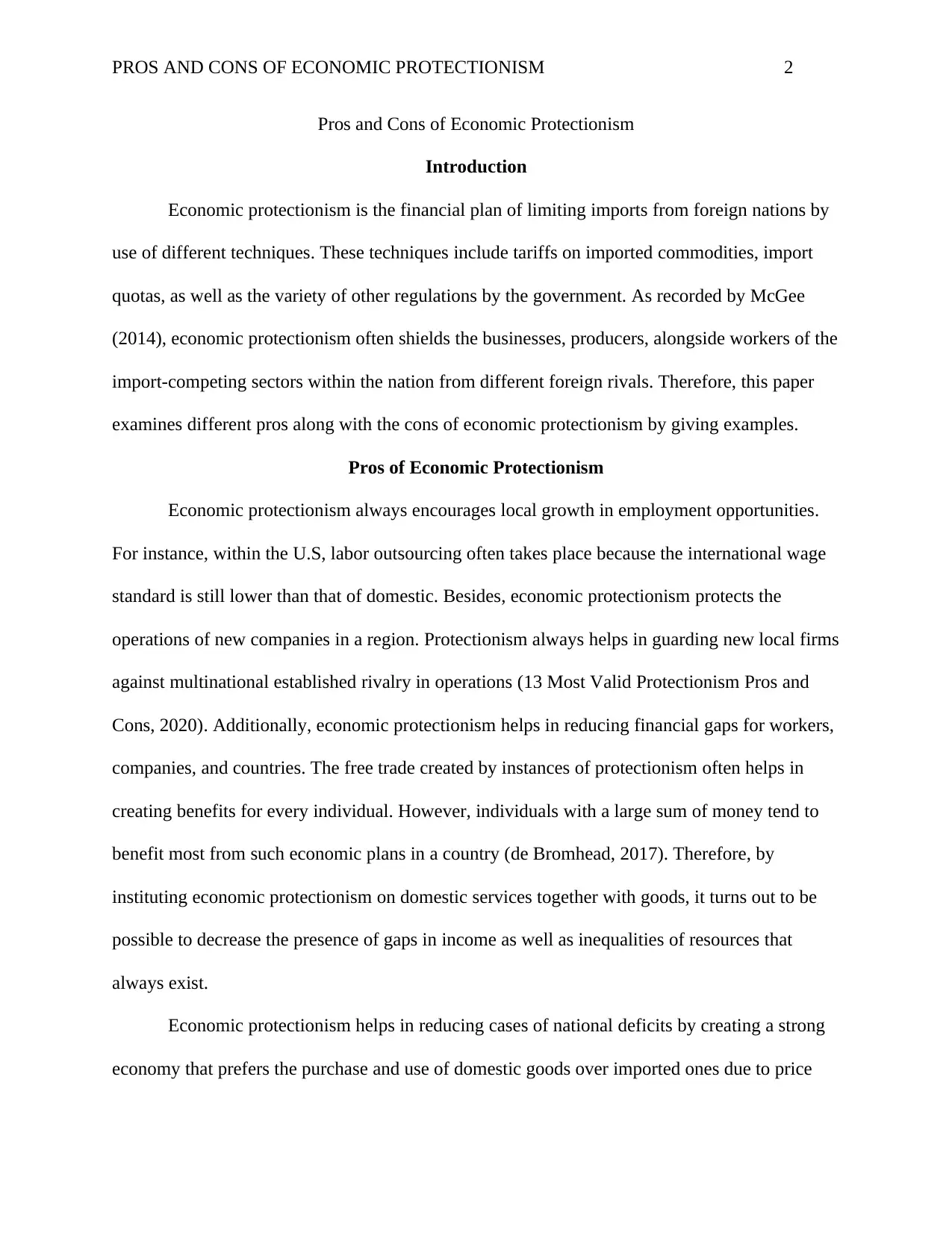
PROS AND CONS OF ECONOMIC PROTECTIONISM 2
Pros and Cons of Economic Protectionism
Introduction
Economic protectionism is the financial plan of limiting imports from foreign nations by
use of different techniques. These techniques include tariffs on imported commodities, import
quotas, as well as the variety of other regulations by the government. As recorded by McGee
(2014), economic protectionism often shields the businesses, producers, alongside workers of the
import-competing sectors within the nation from different foreign rivals. Therefore, this paper
examines different pros along with the cons of economic protectionism by giving examples.
Pros of Economic Protectionism
Economic protectionism always encourages local growth in employment opportunities.
For instance, within the U.S, labor outsourcing often takes place because the international wage
standard is still lower than that of domestic. Besides, economic protectionism protects the
operations of new companies in a region. Protectionism always helps in guarding new local firms
against multinational established rivalry in operations (13 Most Valid Protectionism Pros and
Cons, 2020). Additionally, economic protectionism helps in reducing financial gaps for workers,
companies, and countries. The free trade created by instances of protectionism often helps in
creating benefits for every individual. However, individuals with a large sum of money tend to
benefit most from such economic plans in a country (de Bromhead, 2017). Therefore, by
instituting economic protectionism on domestic services together with goods, it turns out to be
possible to decrease the presence of gaps in income as well as inequalities of resources that
always exist.
Economic protectionism helps in reducing cases of national deficits by creating a strong
economy that prefers the purchase and use of domestic goods over imported ones due to price
Pros and Cons of Economic Protectionism
Introduction
Economic protectionism is the financial plan of limiting imports from foreign nations by
use of different techniques. These techniques include tariffs on imported commodities, import
quotas, as well as the variety of other regulations by the government. As recorded by McGee
(2014), economic protectionism often shields the businesses, producers, alongside workers of the
import-competing sectors within the nation from different foreign rivals. Therefore, this paper
examines different pros along with the cons of economic protectionism by giving examples.
Pros of Economic Protectionism
Economic protectionism always encourages local growth in employment opportunities.
For instance, within the U.S, labor outsourcing often takes place because the international wage
standard is still lower than that of domestic. Besides, economic protectionism protects the
operations of new companies in a region. Protectionism always helps in guarding new local firms
against multinational established rivalry in operations (13 Most Valid Protectionism Pros and
Cons, 2020). Additionally, economic protectionism helps in reducing financial gaps for workers,
companies, and countries. The free trade created by instances of protectionism often helps in
creating benefits for every individual. However, individuals with a large sum of money tend to
benefit most from such economic plans in a country (de Bromhead, 2017). Therefore, by
instituting economic protectionism on domestic services together with goods, it turns out to be
possible to decrease the presence of gaps in income as well as inequalities of resources that
always exist.
Economic protectionism helps in reducing cases of national deficits by creating a strong
economy that prefers the purchase and use of domestic goods over imported ones due to price
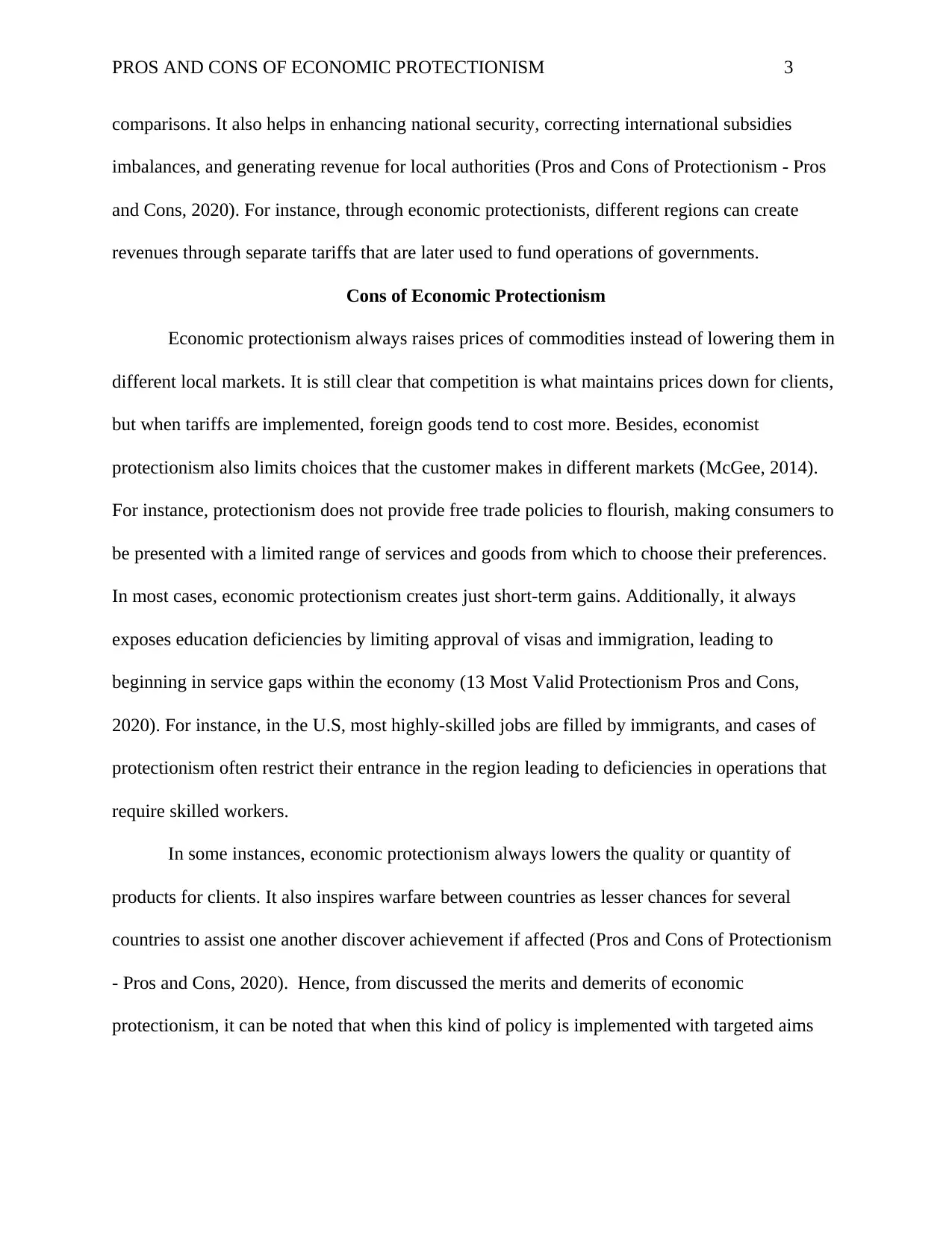
PROS AND CONS OF ECONOMIC PROTECTIONISM 3
comparisons. It also helps in enhancing national security, correcting international subsidies
imbalances, and generating revenue for local authorities (Pros and Cons of Protectionism - Pros
and Cons, 2020). For instance, through economic protectionists, different regions can create
revenues through separate tariffs that are later used to fund operations of governments.
Cons of Economic Protectionism
Economic protectionism always raises prices of commodities instead of lowering them in
different local markets. It is still clear that competition is what maintains prices down for clients,
but when tariffs are implemented, foreign goods tend to cost more. Besides, economist
protectionism also limits choices that the customer makes in different markets (McGee, 2014).
For instance, protectionism does not provide free trade policies to flourish, making consumers to
be presented with a limited range of services and goods from which to choose their preferences.
In most cases, economic protectionism creates just short-term gains. Additionally, it always
exposes education deficiencies by limiting approval of visas and immigration, leading to
beginning in service gaps within the economy (13 Most Valid Protectionism Pros and Cons,
2020). For instance, in the U.S, most highly-skilled jobs are filled by immigrants, and cases of
protectionism often restrict their entrance in the region leading to deficiencies in operations that
require skilled workers.
In some instances, economic protectionism always lowers the quality or quantity of
products for clients. It also inspires warfare between countries as lesser chances for several
countries to assist one another discover achievement if affected (Pros and Cons of Protectionism
- Pros and Cons, 2020). Hence, from discussed the merits and demerits of economic
protectionism, it can be noted that when this kind of policy is implemented with targeted aims
comparisons. It also helps in enhancing national security, correcting international subsidies
imbalances, and generating revenue for local authorities (Pros and Cons of Protectionism - Pros
and Cons, 2020). For instance, through economic protectionists, different regions can create
revenues through separate tariffs that are later used to fund operations of governments.
Cons of Economic Protectionism
Economic protectionism always raises prices of commodities instead of lowering them in
different local markets. It is still clear that competition is what maintains prices down for clients,
but when tariffs are implemented, foreign goods tend to cost more. Besides, economist
protectionism also limits choices that the customer makes in different markets (McGee, 2014).
For instance, protectionism does not provide free trade policies to flourish, making consumers to
be presented with a limited range of services and goods from which to choose their preferences.
In most cases, economic protectionism creates just short-term gains. Additionally, it always
exposes education deficiencies by limiting approval of visas and immigration, leading to
beginning in service gaps within the economy (13 Most Valid Protectionism Pros and Cons,
2020). For instance, in the U.S, most highly-skilled jobs are filled by immigrants, and cases of
protectionism often restrict their entrance in the region leading to deficiencies in operations that
require skilled workers.
In some instances, economic protectionism always lowers the quality or quantity of
products for clients. It also inspires warfare between countries as lesser chances for several
countries to assist one another discover achievement if affected (Pros and Cons of Protectionism
- Pros and Cons, 2020). Hence, from discussed the merits and demerits of economic
protectionism, it can be noted that when this kind of policy is implemented with targeted aims
⊘ This is a preview!⊘
Do you want full access?
Subscribe today to unlock all pages.

Trusted by 1+ million students worldwide
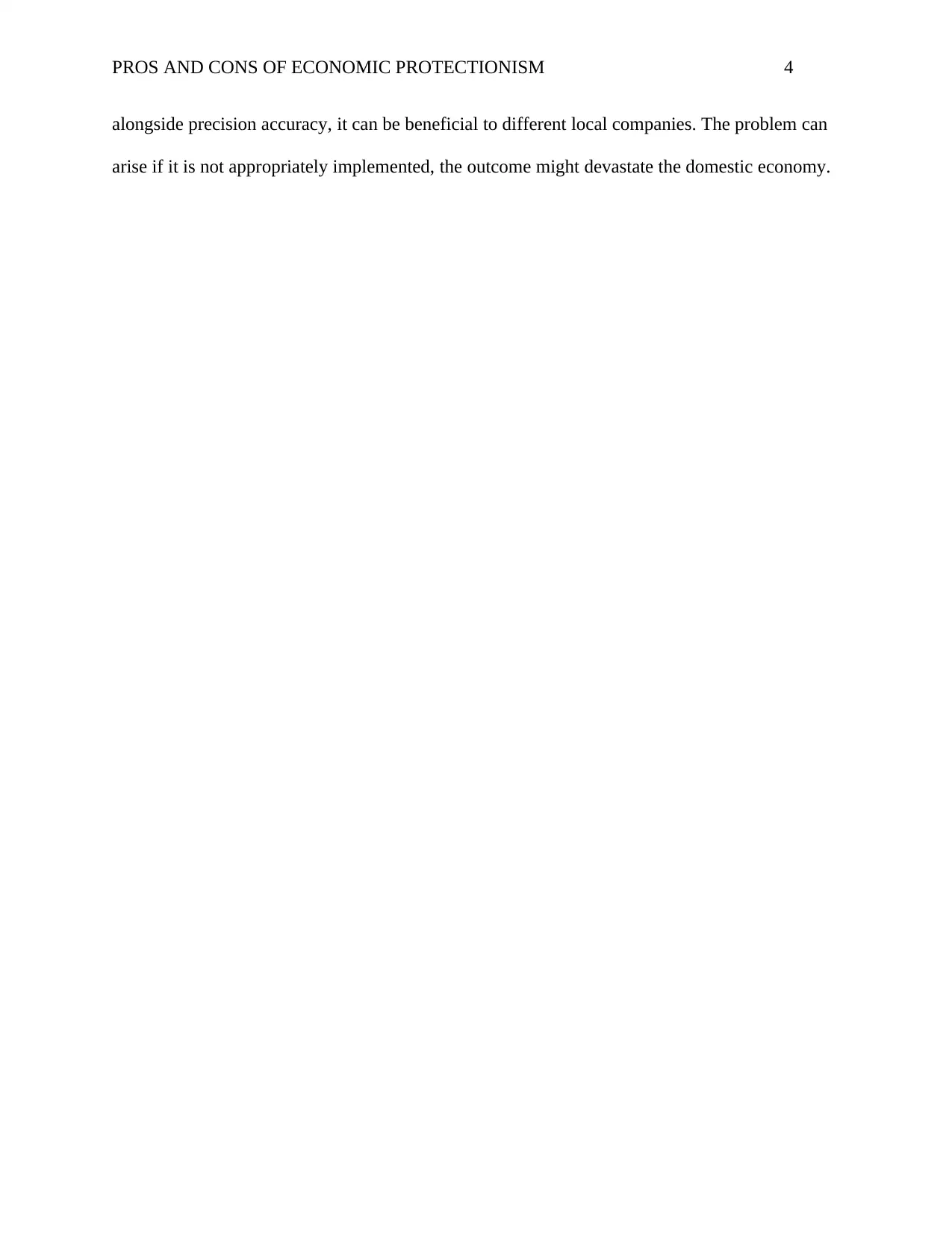
PROS AND CONS OF ECONOMIC PROTECTIONISM 4
alongside precision accuracy, it can be beneficial to different local companies. The problem can
arise if it is not appropriately implemented, the outcome might devastate the domestic economy.
alongside precision accuracy, it can be beneficial to different local companies. The problem can
arise if it is not appropriately implemented, the outcome might devastate the domestic economy.
Paraphrase This Document
Need a fresh take? Get an instant paraphrase of this document with our AI Paraphraser
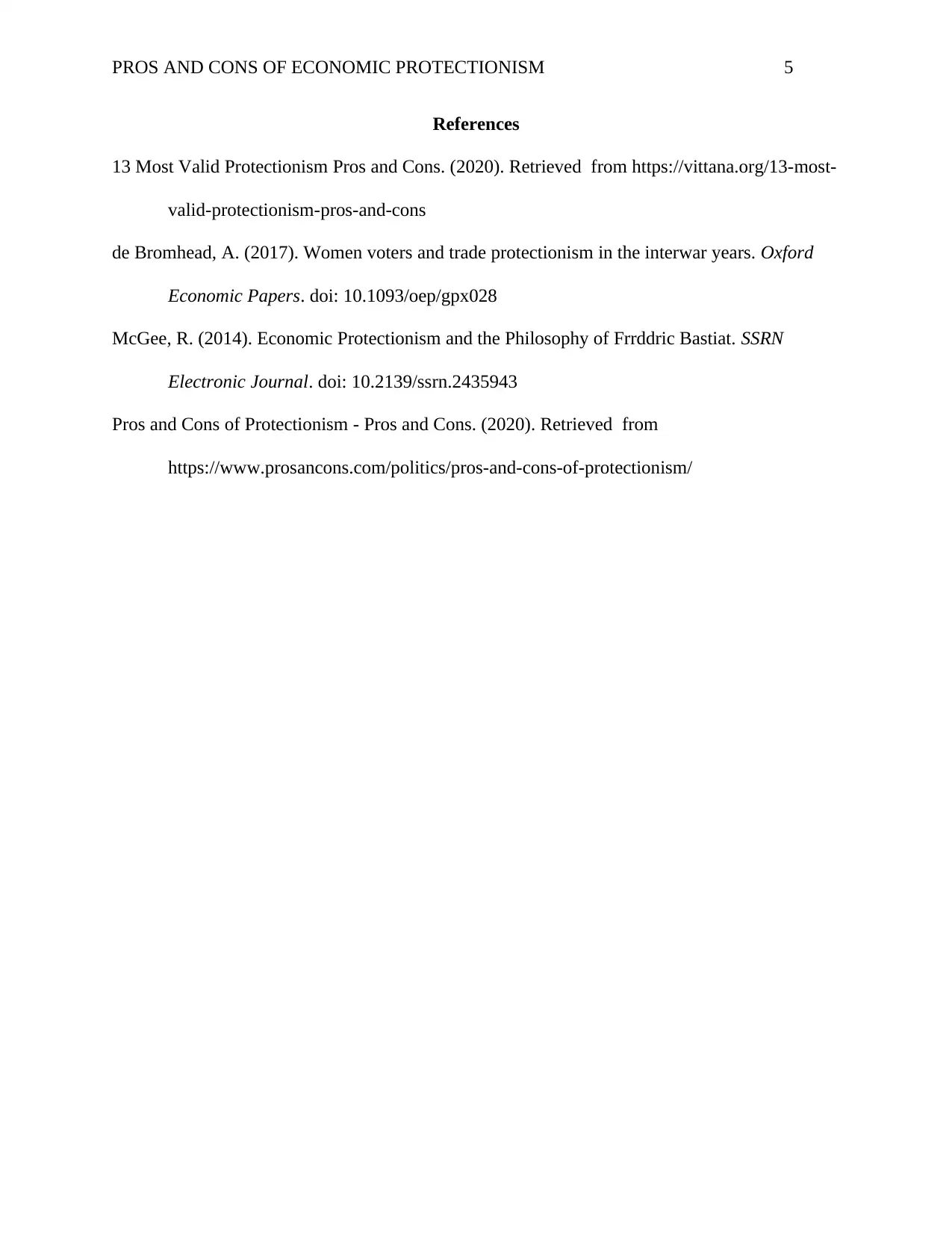
PROS AND CONS OF ECONOMIC PROTECTIONISM 5
References
13 Most Valid Protectionism Pros and Cons. (2020). Retrieved from https://vittana.org/13-most-
valid-protectionism-pros-and-cons
de Bromhead, A. (2017). Women voters and trade protectionism in the interwar years. Oxford
Economic Papers. doi: 10.1093/oep/gpx028
McGee, R. (2014). Economic Protectionism and the Philosophy of Frrddric Bastiat. SSRN
Electronic Journal. doi: 10.2139/ssrn.2435943
Pros and Cons of Protectionism - Pros and Cons. (2020). Retrieved from
https://www.prosancons.com/politics/pros-and-cons-of-protectionism/
References
13 Most Valid Protectionism Pros and Cons. (2020). Retrieved from https://vittana.org/13-most-
valid-protectionism-pros-and-cons
de Bromhead, A. (2017). Women voters and trade protectionism in the interwar years. Oxford
Economic Papers. doi: 10.1093/oep/gpx028
McGee, R. (2014). Economic Protectionism and the Philosophy of Frrddric Bastiat. SSRN
Electronic Journal. doi: 10.2139/ssrn.2435943
Pros and Cons of Protectionism - Pros and Cons. (2020). Retrieved from
https://www.prosancons.com/politics/pros-and-cons-of-protectionism/
1 out of 5
Related Documents
Your All-in-One AI-Powered Toolkit for Academic Success.
+13062052269
info@desklib.com
Available 24*7 on WhatsApp / Email
![[object Object]](/_next/static/media/star-bottom.7253800d.svg)
Unlock your academic potential
Copyright © 2020–2026 A2Z Services. All Rights Reserved. Developed and managed by ZUCOL.





